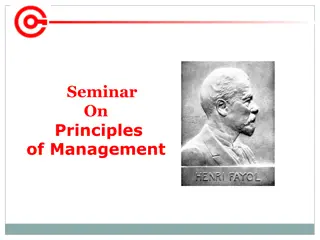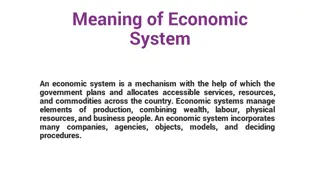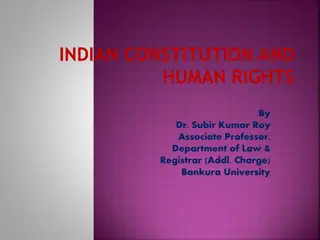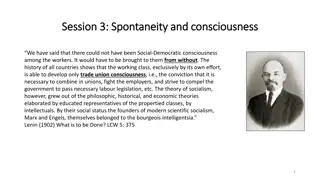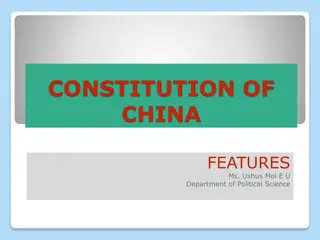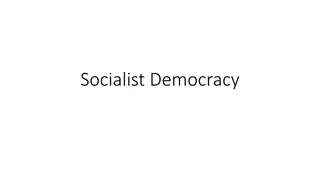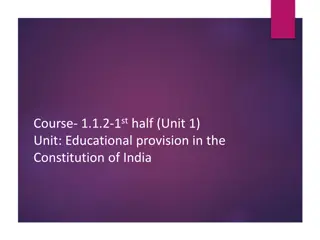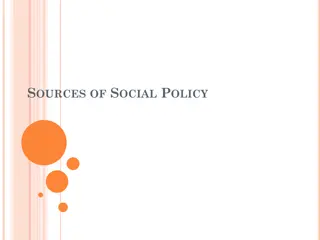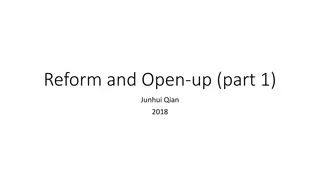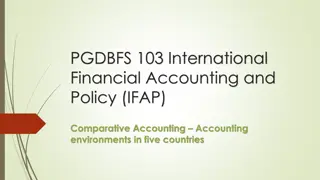Principles of the Ghana Civil Service Code of Conduct
The Code of Conduct for the Ghana Civil Service, outlined by Elizabeth Obeng-Yeboah, emphasizes principles such as abiding by the constitution and laws with dignity, integrity, and professionalism. It sets standards for conduct, avoiding conflicts of interest, maintaining political neutrality, and u
1 views • 34 slides
Academic Freedom and Shared Governance in Higher Education
Academic Freedom and Shared Governance are foundational principles advocated by the American Association of University Professors (AAUP) to ensure educators have the freedom to explore, research, teach, and discuss without censorship. These principles empower educators to enhance student learning an
0 views • 9 slides
Essential Principles of Management Discussed in Seminar
Explore the foundational principles of management discussed in a seminar on principles of management. Delve into topics such as division of work, authority, discipline, unity of command, and unity of direction as outlined by Henri Fayol. Gain insights into the importance of these principles for effe
0 views • 22 slides
Understanding Economic Systems and Sectors
An economic system is a mechanism through which the government plans and allocates resources and services. Types include capitalist, socialist, and mixed economies, each with distinct characteristics. The central problem of the economy is managing scarcity. The economic sector comprises the primary,
2 views • 5 slides
Exploring Responsibility and Social Change in 'Young and Old' Play
In the play "Young and Old," the characters Eric, Sheila, and Gerald represent the younger generation, while Arthur and Sybil symbolize the older generation. The story delves into the concept of responsibility, highlighting the different attitudes towards Eva's death. Arthur and Sybil, despite being
0 views • 9 slides
International Law of War: Nuremberg Principles and Accountability
The Nuremberg Principles, derived from the trials of Nazi officials for war crimes, establish accountability in international law. These principles hold individuals responsible for committing acts considered crimes under international law, regardless of their position or orders received. The assumpt
2 views • 22 slides
George Bernard Shaw: Influential Playwright and Social Critic
George Bernard Shaw, an Irish playwright, social critic, and political activist, is renowned for his witty language and social criticism in works like "Arms and the Man," "Pygmalion," and "Saint Joan." Shaw's influence on British socialist theory through Fabianism and his embodiment of realism in En
0 views • 25 slides
Indian Constitution and Human Rights: A Comprehensive Overview
The Indian constitution embodies justice in social, economic, and political spheres, aiming for the full development of every individual. Rooted in democratic principles and socialism, the preamble emphasizes liberty, equality, and justice. Drawing wisdom from leaders like Dr. Ambedkar and Mahatma G
0 views • 10 slides
Promoting Ethical Principles in Social Science Research
Explore the challenges and strategies for translating and applying ethical principles, especially in emergency contexts. Learn key questions in social science research and how to ensure information contributes to community actions. Understand the importance of considering ethical principles in all w
0 views • 21 slides
The Role of Consciousness in Social-Democratic Thought
The development of socialist consciousness among the working class is discussed, emphasizing the need for outside influence to foster class and political awareness. Key figures such as Lenin and Kautsky are cited in their exploration of how consciousness is acquired and its significance in the labor
0 views • 6 slides
Contextual Evolution in J.B. Priestley's Play: An Inspector Calls
J.B. Priestley's play "An Inspector Calls" was set in 1912 but written in 1945, reflecting the significant changes in society between these years. Explore the context and events that influenced Priestley's work, showcasing his socialist views and the impact of historical events like WWI and WWII on
0 views • 12 slides
Features of China's 1982 Constitution
The 1982 Constitution of China, drafted after extensive discussions, adheres to socialist principles and emphasizes the socialist system as the foundation of the state. With a total of 138 Articles, it is a flexible document allowing for easy amendments and maintains a unitary system with centralize
2 views • 13 slides
Evolution of Companies and Global Business Impact
The presentation delves into the historical evolution of companies, from ancient multi-nationals to modern global corporations. It explores the intertwined relationships between economic expansion, colonialism, capitalism, and socialist movements. The presentation also discusses the role of companie
0 views • 20 slides
Understanding Socialist Democracy: A Political Ideology Explained
Socialist democracy is a political idea that combines elements of democracy and socialism, rejecting capitalism and authoritarian socialism. Proponents advocate for democratic decision-making and public ownership of the means of production. They believe in economic equality, government regulation of
2 views • 13 slides
Directive Principles of State Policy in the Indian Constitution
The Directive Principles of State Policy in the Indian Constitution provide guidelines for governance, focusing on social justice, economic welfare, and a just society. These principles are inspired by socialist ideology and aim at ensuring social and economic justice by minimizing inequalities, pro
2 views • 16 slides
Evolution of Parental Leave Policies in Bulgaria: A Historical Overview
Explore the transformation of parental leave policies in Bulgaria from the socialist era to the modern EU influence. The seminar delves into the progression of rights and entitlements for parents, inclusive of various family structures and dynamic societal needs. Key topics include paid parental lea
0 views • 18 slides
Role of Money in a Socialist Economy
Money in a socialist economy serves various essential functions such as a measure of value, medium of circulation, means of payment, accumulation, and distribution, along with providing monetary incentives and freedom of choice to individuals. It plays a crucial role in evaluating economic activity
0 views • 5 slides
Study Guide for Principles of Management Course at Africa Research University (ARU)
Welcome to Africa Research University (ARU)! This study guide is designed to help you navigate through the Principles of Management course (Course Code: PRM4) at ARU. It provides an introduction to the course content, emphasizing the importance of developing management skills to effectively lead and
1 views • 40 slides
Principles of Training: Overload, Specificity, and Progression
Principles of training encompass overload, specificity, and progression. Overload requires doing more than usual, specificity involves tailored activities, and progression ensures gradual advancement. These principles are vital for improving fitness levels safely and effectively, emphasizing the nee
8 views • 17 slides
Building Socialism: Strategies for Social Change and Political Action
Explore the process of social change towards socialism through mass action, organization, and the building of a socialist party. Emphasizing the importance of campaigns, reforms, and transitional methods, the journey involves uniting the working class, challenging the capitalist system, and particip
4 views • 10 slides
Data Coops and Power Dispersal in Digital Society
Michele Loi from the Digital Society Initiative at the University of Zurich discusses the concept of data cooperatives and their role in distributing data power. These cooperative structures allow for democratic control over data management, emphasizing individual ownership and shared asset utilizat
0 views • 19 slides
Insights into Animal Farm: A Narrative of Betrayal and Manipulation
The narrative of Animal Farm encapsulates the evolution from an idealistic society to a manipulative regime, illustrating themes of betrayal, rule violations, manipulation, leadership exaggeration, harsh penalties, rumor spreading, forced labor, and emotional suppression within a communist-socialist
0 views • 10 slides
The Rise of Adolf Hitler and the Nazi Party: A Historical Overview
Adolf Hitler, born in Austria in 1889, faced rejection as a painter before turning to politics. He led the National Socialist German Workers Party (Nazi) and orchestrated the failed Beer Hall Putsch in 1923. Imprisoned briefly, he penned Mein Kampf that propagated Nazi ideology. By 1932, the Nazi Pa
0 views • 15 slides
Effective Partnership and Mutual Accountability in Nutrition Clusters
The content discusses the minimum commitments needed for participation in Nutrition Clusters, explains the Principles of Partnership, and explores how these principles can enhance coordination and accountability to affected populations. It emphasizes partner commitments, such as leadership, mainstre
0 views • 7 slides
Rise of Mussolini in Italy and Weaknesses of the Liberal Monarchy
The historical timeline of Italy before 1919 led to Mussolini's rise to power through various events such as his involvement with the Italian Socialist Party and the formation of the Fascio di Combattimento. Italy's Liberal Monarchy faced weaknesses, including political divisions between progressive
0 views • 35 slides
Overview of Fundamental Principles of Space Law and Outer Space Treaties
The content discusses the fundamental principles of space law highlighted at the United Nations Space Law Conference 2020, focusing on key treaties such as the Outer Space Treaty of 1967 and associated rights, duties, and obligations of states in space exploration and use, including non-appropriatio
0 views • 16 slides
Overview of Directive Principles of State Policy in Indian Constitution
Directive Principles of State Policy (DPSP) in the Indian Constitution encompass social, economic, and political programs aimed at realizing ideals of justice, liberty, equality, and fraternity. They are non-justiciable but guide the state in legislative matters. Classified into Socialistic, Gandhia
0 views • 24 slides
Election of 1912 and Its Impact on APUSH Students
Explore the dynamic Election of 1912 in US history, featuring William Howard Taft, Theodore Roosevelt, Woodrow Wilson, and Eugene Debs. Learn about the split in the Republican Party, Wilson's victory, Debs' Socialist impact, and the rise of the Progressive Party. Subscribe for more educational conte
0 views • 5 slides
Understanding FAIR Principles in Biomedical Research
The FAIR principles - Findable, Accessible, Interoperable, and Reusable - provide a framework for ensuring scientific data in biomedical research is managed and shared effectively. This informative session delves into the theory and practice of FAIR principles, emphasizing the importance of data qua
0 views • 28 slides
The FAIR Principles for Data Management and Stewardship
Embrace the FAIR principles - Findable, Accessible, Interoperable, Re-usable - for effective scientific data management and stewardship. Learn how annotations enhance data FAIRness and the key attributes of each principle. Dive into the high-level guiding principles that ensure data is globally uniq
0 views • 25 slides
Rental Sector Trends and Policy Evolution in Slovenia and Serbia
Explore the evolution of the rental sector in Slovenia and Serbia, from the socialist order to privatization and the current challenges faced in providing social housing. Key events, documents, and legislative acts have shaped the rental landscape in these transition countries, impacting ownership r
0 views • 16 slides
Rental Tenures in Slovenia: Insights from Post-Socialist Countries
Slovenia exhibits a unique tenure structure with a high percentage of home ownership and specific regulations governing rental tenures. The 2003 Housing Act defines various rental types, including non-profit and market-based rentals, while legislation outlines rules on contracts, rent regulation, an
0 views • 13 slides
Understanding the Guiding Principles for Evaluators
This content provides insights into the Guiding Principles for Evaluators, including their history, assumptions, and key principles such as Systematic Inquiry and Competence. The workshop aims to increase knowledge about ethical evaluation practices and stimulate discussions within the evaluation co
0 views • 22 slides
Guiding Principles for GETSI/INTEGRATE Webinar – Materials Development and Goals
The webinar presented by David Steer from the University of Akron focuses on guiding principles for material development in the context of GETSI/INTEGRATE modules. It outlines goals for the session, including discussing components of the guiding principles, examples of meeting those principles, and
0 views • 13 slides
Reform and Open-up: The Evolution of Chinese Rural Economy
This article delves into the historical background and key events that shaped the reform and open-up policies in China, focusing on the transformation of the countryside, the rise of Township and Village Enterprises (TVEs), and the implementation of the Household Responsibility System (HRS). It disc
0 views • 28 slides
Accounting Environment in Peoples Republic of China (PRC)
The accounting environment in Peoples Republic of China (PRC) has undergone significant changes from a planned economy to a socialist market economy. With the emergence of private enterprises and foreign investments, the accounting profession has evolved as well. Guanxi, the concept of networks and
0 views • 22 slides
Soviet Socialist Realism: Artistic Representation of Revolutionary Development
Socialist Realism emerged as the fundamental method of Soviet literature and art, emphasizing truthful and historically concrete depictions of reality within a revolutionary context. It required artists to engage in ideological transformation and educate the masses in the spirit of socialism. This a
0 views • 21 slides
Insights from Yugoslavian Economic Growth Model Analysis
This paper revisits socialist growth in Yugoslavia, focusing on model-based assessment of economic determinants and findings related to Total Factor Productivity (TFP) growth. The model decomposes output growth deviations, discussing factors like efficiency wedge, labor wedge, investment wedge, and
0 views • 12 slides
The National Socialist Consolidation of Power - Legal Revolution in the Reichstag
Hitler's consolidation of power in Germany involved strategic maneuvers such as exploiting the Reichstag fire to pass emergency decrees, suspending civil liberties, and ultimately passing the Enabling Act, granting him dictatorial powers. These actions allowed Hitler to establish a totalitarian regi
0 views • 23 slides
Analysis of Labor Movements in the Globalization Era
Contemporary labor movements in the era of globalization differ from previous periods, influenced by factors such as globalization, European integration, the collapse of the socialist system, and economic disparities. The dynamics of migration have evolved, impacting various countries and regions. T
0 views • 29 slides


